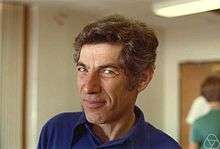Reuben Hersh

Reuben Hersh (born 1927) is an American mathematician and academic, best known for his writings on the nature, practice, and social impact of mathematics. This work challenges and complements mainstream philosophy of mathematics. ("Hersh" is his professional or "pen" name. His family name is Reuben Laznovsky.)
After receiving a B.A. in English literature from Harvard University in 1946, Hersh spent a decade writing for Scientific American and working as a machinist. After losing his right thumb when working with a band saw he decided to study mathematics at the Courant Institute of Mathematical Sciences. In 1962, he was awarded a Ph.D. in mathematics from New York University; his advisor was P.D. Lax. He has been affiliated with the University of New Mexico since 1964, where he is now professor emeritus.
Hersh has written a number of technical articles on partial differential equations, probability, random evolutions, and linear operator equations. He is the (co)author of four articles in Scientific American, and 12 articles in the Mathematical Intelligencer.
Hersh is best known as the coauthor with Philip J. Davis of The Mathematical Experience (1981), which won a National Book Award in Science.[1][lower-alpha 1]
Hersh advocates what he calls a "humanist" philosophy of mathematics, opposed to both Platonism (so-called "realism") and its rivals nominalism/fictionalism/formalism. He holds that mathematics is real, and its reality is social-cultural-historical, located in the shared thoughts of those who learn it, teach it, and create it. His article "The Kingdom of Math is Within You" (a chapter in his "Experiencing Mathematics, 2014) explains how mathematicians' proofs compel agreement, even when they are inadequate as formal logic. He sympathizes with the perspectives on mathematics of Imre Lakatos and Where Mathematics Comes From, George Lakoff and Rafael Nunez, Basic Books.
Books
- 1981, Hersh and Philip Davis. The Mathematical Experience. (Mariner Books, 1999).
- 1986, Hersh and Philip Davis. Descartes' Dream: The World According to Mathematics. (Dover, 2005)
- 1997. What Is Mathematics, Really? Oxford Univ. Press.
- 2006, edited by Hersh. 18 Unconventional Essays on the Nature of Mathematics. Springer Verlag.
- 2009, Hersh and Vera John-Steiner. Loving and Hating Mathematics.Princeton University Press
- Greenwood, P.; Hersh, R. Stochastic differentials and quasi-standard random variables. Probabilistic methods in differential equations (Proc. Conf., Univ. Victoria, Victoria, B. C., 1974), pp. 35–62. Lecture Notes in Math., Vol. 451, Springer, Berlin, 1975.
- 2014, Reuben Hersh. "Experiencing Mathematics: What do we do, when we do mathematics?" American Mathematical Society.
- 2015, Reuben Hersh. "Peter Lax: Mathematician" American Mathematical Society.
See also
Notes
- ↑ This was the 1983 award for paperback Science.
From 1980 to 1983 in National Book Award history there were dual hardcover and paperback awards in most categories, and several nonfiction subcategories including General Nonfiction. Most of the paperback award-winners were reprints, including this one.
References
- ↑ "National Book Awards – 1983". National Book Foundation. Retrieved 2012-03-07.
External links
- ,"The Ideal Mathematician". [This link seems to be broken.]
- Web page at the Univ. of New Mexico.
- Published Articles at googlesites.